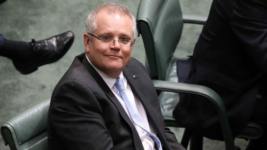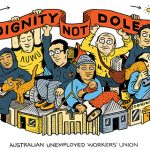“The Best Form of Welfare is a Job”: PM Refuses to Raise Welfare Payments

“The best form of welfare is a job,” prime minister Scott Morrison suggested to the House of Representatives on 29 July, as he was justifying why he wouldn’t be raising the rate of the pittance Newstart allowance.
Rather than upping the main welfare payment, Morrison prefers that those on unemployment benefits continue to suffer on a measly $277.85 a week, while he and his Coalition cronies supposedly take turns at brainstorming how they’re going to get all of the nation’s unemployed jobs.
In May, there were 714,952 Australians surviving on $40 a day Newstart. And close to 541,000 of them were long-term job seekers, meaning they hadn’t had a job for over 12 months. And Morrison reckons these people should remain in a situation where 84 percent of them are skipping meals.
Indeed, in the PM’s understanding, what the Labor party was up to at the last election when it promised to raise Newstart was “unfunded empathy”, which would differ from his government’s recent miraculously-funded substantial tax cuts.
But, it stands to reason that the Liberal Nationals approach is to continue to punish some of the poorest and most marginalised people in the community, as that’s its thing – just look at offshore detention, the refusal to act on treaty and climate inaction, as the tides rise in the Torres Strait.
Let them eat nothing
Australian Unemployed Workers’ Union (AUWU) spokesperson Jeremy Poxon explains that the line Morrison and others were feeding last week has been the same for the past decade. And while these politicians are “beating their chests about amazing job figures”, there are two major problems.
The first is “the starvation conditions that people out of work are dealing with”, as they’re “living so far below the poverty line”. And the other is the way Morrison is “painting a very disingenuous picture of the labour market” and what his government is doing to help.
“The simple fact is most jobseekers are locked out of work because there aren’t enough jobs available,” Mr Poxon made clear. This was a point underscored by ACOSS recently when it stated that there’s “only one job available for every eight people looking”.
According to Poxon, Morrison keeps banging on about “creating all these jobs”, but the reality is that today, for the first time since statistics have been recorded, less than half of employed Australians have a permanent full-time job with leave entitlements.
“They’re deliberately failing Newstart recipients, who we know are skipping meals to survive,” the welfare recipient rights advocate told Sydney Criminal Lawyers. “We should be clear economically that this is a purposeful decision made by government.”
Punishing the poor
The Newstart allowance hasn’t been increased in real terms since Keating raised it in 1994. The Howard government linked it to inflation, so it rises in line with that, rather than being aligned to wages rises, like the pension.
Currently, the unemployment rate is at 5.2 percent, which means over 700,000 members of the workforce are unable to find gainful employment. And those forced onto benefits are simply condemned to live without enough money to survive, because that’s how the government wants it.
A recent ACOSS survey found that more than half of Newstart recipients have less than $100 a week left to spend after housing costs, while 54 percent don’t buy fresh produce and 44 percent skip more than five meals a week.
Coupled with this is the high level of stigma the unemployed have to put up with. Even though there aren’t enough jobs to go around for all Australians of working age, the fallacy that this is somehow the fault of the unemployed still lies just beneath the surface of Morrison’s rhetoric.
Saying “the best form of welfare is a job” reeks of the old “dole bludger” trope: those citizens sans employment living it large on the taxpayers’ cheque. So, not only are these people forced to live below the poverty line, but they’re also being highly derided as they go.
Job seeking on nothing
In response to a question about whether living on such a meagre allowance can affect a welfare recipient’s ability to get out there and seek employment, Mr Poxon said it’s something that the union hears about regularly over the AUWU hotline.
“When every single day is a struggle just to get food on the table for you and your family, it’s incredibly difficult to do the kind of things that are expected of people to find work,” Mr Poxon related. And he added that some can’t afford fuel or even clothes to look presentable.
“Our unemployed people are some of the poorest in the developed world,” Poxon continued. “Telling them that if there are no jobs in the community, they should travel out of town to get one” is basically impossible for a person who can “barely afford one meal a day”.
And while denying the unemployed the means to be able to effectively look for employment, the government has also devised some other hoops for them to jump through, with a range of harsh compliance measures recipients must abide by to ensure they receive their payments.
Cheap labour
The most time consuming and counterproductive compliance measure in terms of getting out there and trying to find a job is the work for the dole program. Mr Poxon says there are around 80,000 unemployment Australians engaged in this cheap labour enterprise.
However, the most discriminatory and punitive scheme that the government is operating out of Centrelink is the Community Development Program (CDP), which sees welfare recipients in regional and rural areas working for the dole.
The overwhelming majority of CDP participants are First Nations people. And they can be made to work for the dole for up to three times longer a week than their counterparts in the city, while the program includes debilitating penalties, which can entail prolonged suspension of payments.
Kept in their place
ACOSS commissioned a 2018 report that considered a policy that would see the Newstart allowance raised by a “catch up increase” of $75 a week. It found the proposal would cost the government $3.3 billion and would boost tax revenue by an extra $1 billion, while creating 12,000 new jobs.
However, question the PM about considering implementing a humane policy in regard to welfare recipients and he’ll divert the conversation to some inane posturing about job figures and make a comment along the lines of “how good are jobs”.
Meanwhile, as Emma Dawson executive director of thinktank Per Capita recently pointed out, the tax breaks this government has just passed are set to “give someone earning $200,000 a year a tax cut of around $10,000 a year by 2024”.
“They’re very clear that they don’t want to give unemployed people enough to eat, because it would eat into the government’s surplus,” Poxon concluded. And this leads to a situation where “it becomes extremely difficult for workers to negotiate” because of the “pool of desperate jobseekers”.







